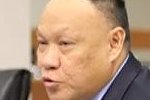By Gail Alexander
May 10, 2018 – guardian.co.tt
 The Government should not institute the property tax since Finance Minister Colm Imbert recently said T&T has “turned the corner” and also projected “good news” in today’s mid-year Budget review, says Opposition Chief Whip David Lee.
The Government should not institute the property tax since Finance Minister Colm Imbert recently said T&T has “turned the corner” and also projected “good news” in today’s mid-year Budget review, says Opposition Chief Whip David Lee.
“He has painted a more positive outlook for T&T in recent weeks. Also, energy prices are better than before. If the situation is really good, Government should have no need to pursue the property tax and inflict further hardship on the public,” Lee said yesterday.
Imbert will deliver his review at 10 am today in Parliament, detailing the economic and financial outlook in the seven months since the 2018 Budget was presented last October. The $50 billion Budget carried a projected $4.76 billion deficit, with measures aimed at reducing this.
Imbert is expected to give the status of Budget plans – including property tax implementation – revenue streams and energy projects and give possible adjustments.
This might extend to amendments to property tax proposals. Debate on the tax continues in the Senate tomorrow with amendments from Government which – in last week’s debate – noted Opposition and Independent senators’ concerns on various aspects of the planned tax.
Full Article : guardian.co.tt

The tax should still be implemented. This budget is based 90% on oil revenues. We can’t depend on oil prices being high all the time. Implement the tax.
UNC solutions again. No forward planning. Take the money now and waste it. The fact that there may be more revenue does not mean that the old spend and splurge mentality. This country needs proper finance management. The people of Trinidad and Tobago must know that freeness is not always the best for the country. Give away, give away – UNC style.
Both governments are guilty of wasteful spending. The only difference is shifting priorities. The economic recovery is based on rising oil prices and gas exploration, an unstable source in a tumultuous world involved in energy transformation, shifting away from fossil fuels.
The country has no long term, proper financial management. No diversification plan is forthcoming, as Imbert is having his orgasm over rising oil prises.
The only clear and definite economic plan presented by Imbert so far is tax, tax, tax again and spend.
Gas and oil are the nation’s patrimony. As such citizens should be the prime beneficiaries of these resources. A tax regime is necessary but must be compassionate to the poor and unemployed. With billions of dollars flowing in the nation’s coffers the HSF should be the prime beneficiary. This is due to the unstable nature of energy prices.
The diversification program modeled after Singapore should be pursued in earnest.
As for the property tax, I will only favour such if the money is collected and stays in the regional coperations. If it is spent to develop communities. And if Parliament makes it the law that this money stays where collected to the good of the citizenry. That is the way property tax can be collected and spent. If that does not happen then it cannot be called a property tax. The regional coperations should be making representations as such.